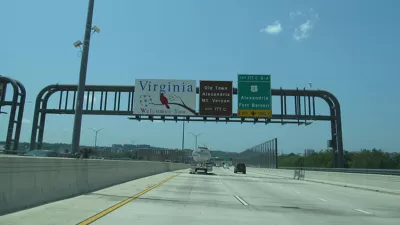Despite installing many innovative traffic management schemes over the years, the 41 miles of highway between Fredericksburg, Virginia and Washington D.C. are snarled by some of the worst traffic in the country. Can HOT lanes change that?
Earl Swift shares the experience of waiting in one of the Beltway’s worst traffic jams: “Of all of Washington's snarled roads, perhaps none are more feared, despised, and lamented than the roughly 41 miles of I-95 between Fredericksburg and the Beltway, and I-395's nine-mile spur from there to the Potomac.”
The traffic persists, although planners have implemented a number of innovative traffic management practices: “In 1969, they installed the first reversible bus lanes in America, on I-395. A few years later they built carpooling in the same lanes — the country's first courtship with high-occupancy vehicle lanes. Later they extended HOV 18 miles southward, into the fast-rising suburbs and exurbs straddling I-95.”
Given the intractability of the corridor’s congestion, the next phase in the evolution of the Beltway commute is the High-Occupancy Toll Lane. “As originally planned, the reversible HOT lanes would continue inside the Beltway in the median of I-395 to the District's very edge: the 14th Street Bridge, where the highway crosses the Potomac. Drivers using the lanes would enjoy a high-speed shot from the far-flung suburbs all the way into town.” The lanes are scheduled to open in early 2015.
The partnership between the state and the private investor is tied to the performance of the lanes. “A key part of the $922.6 million deal — under which the state will supply $82.6 million of the project's cost, and Fluor-Transurban will pony up the balance in cash and debt — is that the HOT lanes will keep flowing at 55 mph.”
Which is where it gets tricky. Virginia’s first experiment with a public-private partnership on HOT lanes—the 495 Express Lanes—has failed to meet expectations. “So far the Beltway lanes have not enticed the number of motorists, or generated the level of revenues, the partners expected. Last year, Transurban figured it would take in $60.2 million; revenues actually totaled less than a third of that amount ($17.2 million). Weekday use was expected to reach 66,000 trips by year's end; reality delivered about 38,000,” writes Swift.
FULL STORY: Putting a Price on D.C.'s Worst Commute

Manufactured Crisis: Losing the Nation’s Largest Source of Unsubsidized Affordable Housing
Manufactured housing communities have long been an affordable housing option for millions of people living in the U.S., but that affordability is disappearing rapidly. How did we get here?

Americans May Be Stuck — But Why?
Americans are moving a lot less than they once did, and that is a problem. While Yoni Applebaum, in his highly-publicized article Stuck, gets the reasons badly wrong, it's still important to ask: why are we moving so much less than before?

Using Old Oil and Gas Wells for Green Energy Storage
Penn State researchers have found that repurposing abandoned oil and gas wells for geothermal-assisted compressed-air energy storage can boost efficiency, reduce environmental risks, and support clean energy and job transitions.

Minneapolis Bans Rent-Setting Software
Four cities have enacted restrictions on algorithmic software that can inflate rent costs.

Oakland to Add 244 New EV Chargers
Oakland plans to launch its new charging network at eight locations by the end of 2025.

Jane Goodall Inspires with Message of Hope, Resilience, and Environmental Action
Speaking in Pasadena, Jane Goodall offered a hopeful and inspirational message, urging global compassion, environmental responsibility, and the power of individual action to shape a better future.
Urban Design for Planners 1: Software Tools
This six-course series explores essential urban design concepts using open source software and equips planners with the tools they need to participate fully in the urban design process.
Planning for Universal Design
Learn the tools for implementing Universal Design in planning regulations.
Heyer Gruel & Associates PA
City of Moreno Valley
Institute for Housing and Urban Development Studies (IHS)
City of Grandview
Harvard GSD Executive Education
Salt Lake City
NYU Wagner Graduate School of Public Service
City of Cambridge, Maryland



























